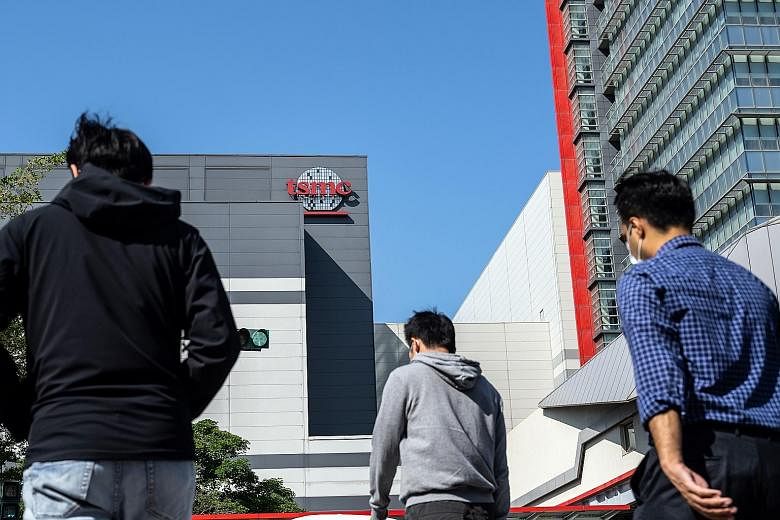TAIPEI • Taiwan Semiconductor Manufacturing Company (TSMC), the world's No. 1 maker of advanced silicon, reported better-than-expected profit as global companies from carmakers to PC suppliers scramble for chips.
Net income for the January to March period climbed 19 per cent to NT$139.7 billion (S$6.56 billion), versus the average analyst estimate of NT$136.2 billion. Gross margin for the quarter eased to 52.4 per cent from 54 per cent in the three months prior, due in part to relatively lower levels of utilisation and exchange-rate fluctuations.
Surging demand for the chips that power Apple's iPhones, smart televisions and connected cars has thrust TSMC into the centre of a global supply chain crunch that has idled auto plants and fuelled a shortage of popular consumer products such as game consoles.
While Taiwan's largest chipmaker has kept its fabs running at "over 100 per cent utilisation", the firm does not have enough capacity to satisfy all its customers, and it has pledged to invest US$100 billion (S$133 billion) over the next three years to expand.
"TSMC is likely to achieve a compound annual growth rate of 15 per cent with its US$100 billion capital expenditure spending over the next three years due to better-than-expected long-term semiconductor demand," Cathay Futures analyst Felix Hsu said in a note dated April 7, adding that he expects the chipmaker's second-quarter guidance to beat consensus.
With major American carmakers and other gadget suppliers facing a prolonged shortage of chips, United States President Joe Biden has proposed US$50 billion to bolster semiconductor research and manufacturing at home.
The initiative could aid TSMC's plan to build a cutting-edge fab in Arizona this year that could cost US$12 billion.
First-quarter revenue rose 17 per cent to NT$362.4 billion, according to a company statement last week. Shares of TSMC have more than doubled over the past year. The stock advanced 1.1 per cent yesterday, before the company reported earnings.
TSMC's most advanced technologies continued to account for nearly half of revenue, with five-nanometre and seven-nanometre processes contributing 14 per cent and 35 per cent of sales respectively.
By business segment, TSMC's smartphone business amounted for about 45 per cent of revenue, while high-performance computing increased to more than a third, reflecting sustained demand for devices even as economies start to emerge from the pandemic.
Semiconductor shortages are cascading through the global economy, and the situation is likely to get worse before it gets better.
A rare winter storm in Texas knocked out swathes of US production. Samsung Electronics warned of a "serious imbalance" in the industry, while TSMC itself has said it cannot keep up with demand despite running factories at more than 100 per cent of capacity.
BLOOMBERG

